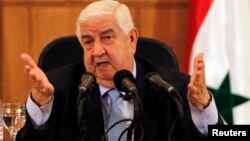CAIRO, EGYPT —
Syrian Foreign Minister Walid al-Muallem has denied again that his government used chemical weapons and he insists that Damascus is cooperating completely with a U.N. investigation team. Members of that U.N. team are awaiting permission to visit a new site, after visiting Madhamiya, a suburb of the capital, on Monday.
Syrian Foreign Minister Walid al-Muallem told journalists that he had a "friendly" 10-minute conversation by telephone Monday with U.S. Secretary of State John Kerry, but he declined to give any details.
Muallem said on Tuesday that Damascus is cooperating fully with the U.N. inspectors and he said that Western nations are presuming Syria's guilt even before the investigation is complete.
Muallem said the allegations that government forces used chemical weapons in Damascus last week are not true. He contends the chemical-weapons accusations are a “pretext” - a false charge circulated by outside powers that want to “invade Damascus ... and then go on to attack Iran.”
The Syrian foreign minister said the U.S. and its allies are pressuring the U.N. team to conclude that Syria carried out last week's devastating attack on civilians. He added the Western powers "talk about international law while they break it themselves."
Britain has accused Damascus of “hiding evidence” from the U.N. inspectors, Muallem said, but that is “impossible... since the evidence lies in areas controlled by [rebel forces].”
Muallem said Syria will “defend itself with everything at its disposition,” if necessary, and that his government expects allies Russia and Iran will “not let Damascus down.”
In Cairo, Arab League Secretary-General Nabil Elaraby said the chemical-weapons attack was "an awful and ugly crime" that must be punished as an "international violation of human rights."
Arab states meeting on the crisis in Syria voted to condemn President Bashar al-Assad's government over the chemical-weapons incident.
In Tehran, Iranian Foreign Ministry spokesman Abbas Ali Arakji said his government “warns [Western states] strongly against any attack on Syria,” because that would “have awful repercussions on the entire region and would not be confined to Syria.”
The U.N. Undersecretary-general for political affairs, Jeffrey Feltman, is due to confer by Wednesday with top Iranian leaders.
Syrian Foreign Minister Walid al-Muallem told journalists that he had a "friendly" 10-minute conversation by telephone Monday with U.S. Secretary of State John Kerry, but he declined to give any details.
Muallem said on Tuesday that Damascus is cooperating fully with the U.N. inspectors and he said that Western nations are presuming Syria's guilt even before the investigation is complete.
Muallem said the allegations that government forces used chemical weapons in Damascus last week are not true. He contends the chemical-weapons accusations are a “pretext” - a false charge circulated by outside powers that want to “invade Damascus ... and then go on to attack Iran.”
The Syrian foreign minister said the U.S. and its allies are pressuring the U.N. team to conclude that Syria carried out last week's devastating attack on civilians. He added the Western powers "talk about international law while they break it themselves."
Britain has accused Damascus of “hiding evidence” from the U.N. inspectors, Muallem said, but that is “impossible... since the evidence lies in areas controlled by [rebel forces].”
Muallem said Syria will “defend itself with everything at its disposition,” if necessary, and that his government expects allies Russia and Iran will “not let Damascus down.”
In Cairo, Arab League Secretary-General Nabil Elaraby said the chemical-weapons attack was "an awful and ugly crime" that must be punished as an "international violation of human rights."
Arab states meeting on the crisis in Syria voted to condemn President Bashar al-Assad's government over the chemical-weapons incident.
In Tehran, Iranian Foreign Ministry spokesman Abbas Ali Arakji said his government “warns [Western states] strongly against any attack on Syria,” because that would “have awful repercussions on the entire region and would not be confined to Syria.”
The U.N. Undersecretary-general for political affairs, Jeffrey Feltman, is due to confer by Wednesday with top Iranian leaders.





